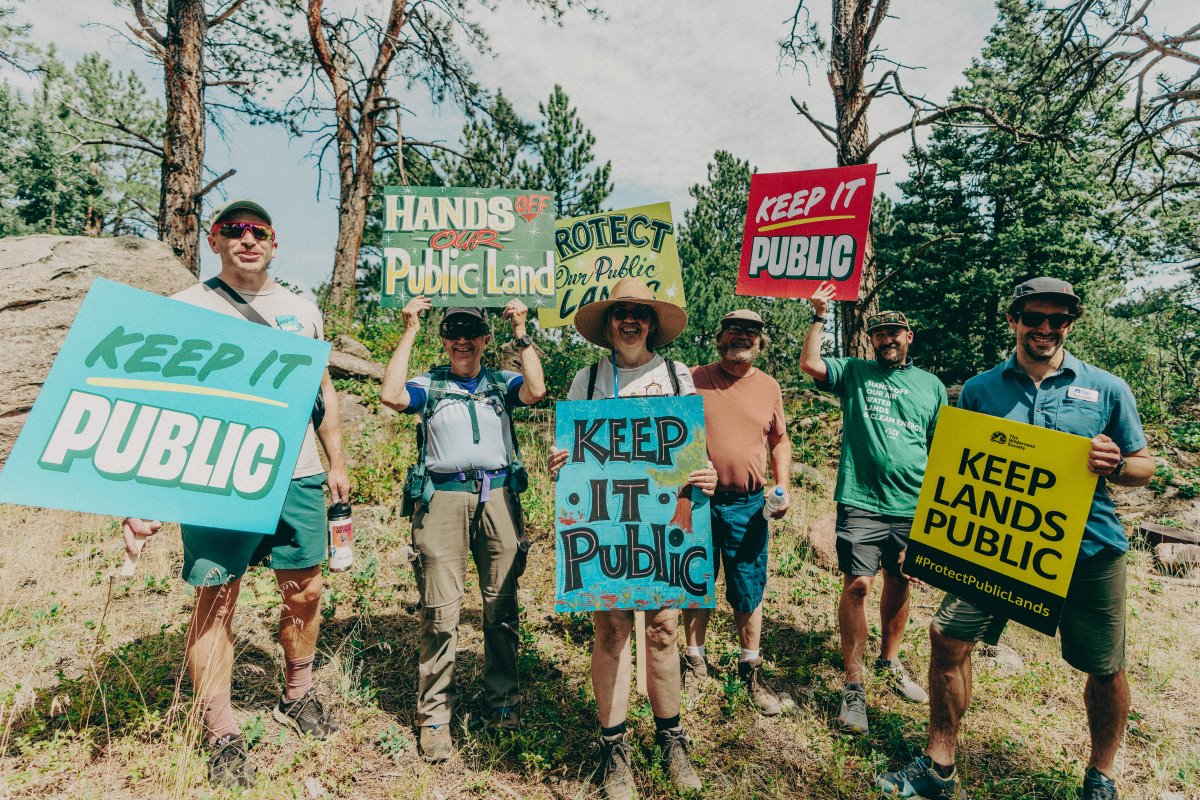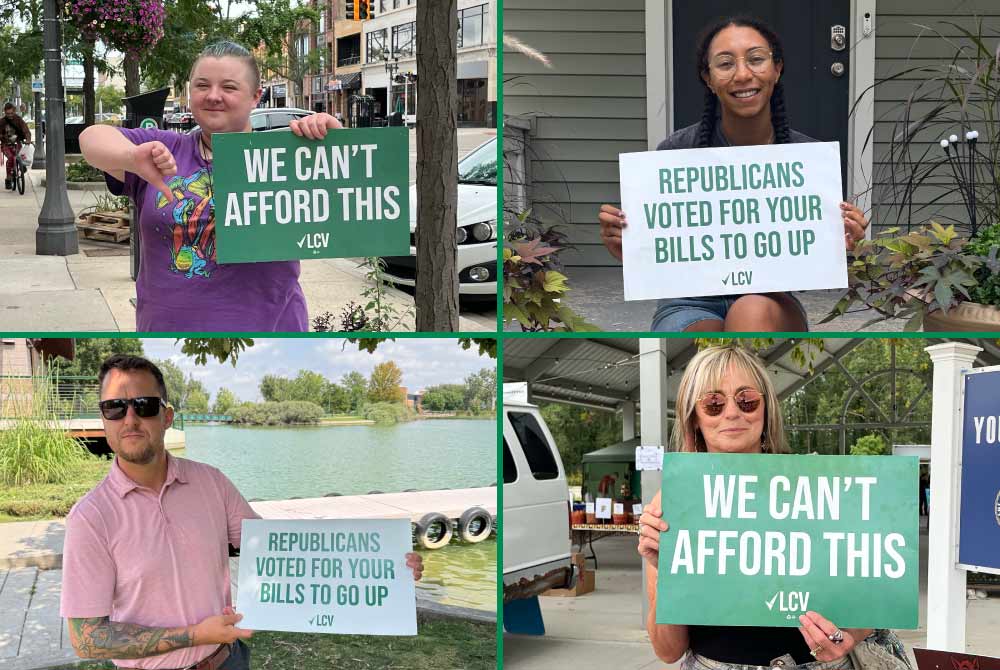
5 Ways the Trump Admin is Selling Out Public Lands and National Parks – And How We’re Fighting Back
Dec 19, 2025
 LCV and partner organizations are mobilizing the public through our accountability campaign.
LCV and partner organizations are mobilizing the public through our accountability campaign.
Each month, LCV shares five stories about our work. This month, we’re focusing on how we’re holding Republicans accountable for their disastrous budget, our Wisconsin affiliate’s clean water win, Chispa’s latest pollution protections, our public lands road show, and how we’re equipping new candidates to win downballot races.
In partnership with leading clean energy and climate action advocates, LCV is blanketing local airwaves and taking to the streets in 16 Congressional districts and counting. Together, we’re holding House Republicans accountable for their disastrous votes on their so-called “Big Beautiful Bill.”
The legislation gives tax breaks to oil and gas billionaires, guts solar and wind energy investments, dismantles environmental justice progress, cuts vital healthcare, and raises energy costs for people across the country.
While members of Congress were home for August recess, we launched our accountability campaign in key districts where representatives voted for the Big Ugly Bill.
Tactics included educating and mobilizing the public through a mix of paid media, grassroots organizing, in-person and visibility events, digital activations, direct mail, and more.
By mid-August, 15 ads had already aired across TV and digital, with dozens more in the works — all part of our $8 million accountability investment.
More than 70 events took place across the target districts, which include AZ-01, AZ‑06, CA-22, CA-40, CO-08, IA-01, MI-07, NV-02, NJ-07, NY-17, OH-15, PA-07, PA-08, PA-10, TX-15, and WI-03.
Dig Deeper: Watch the ads and learn more about our accountability campaign.
Wisconsin Conservation Voters’ (WCV) recently won a legislative victory that will protect drinking water and public health for generations.
WCV worked for years to make progress on this issue, educating lawmakers and mobilizing community members to advocate for safe water:
They started by identifying safe drinking water as a winning issue, with 87% of swing voters supporting protecting water from pollutants.
They made a strategic decision to unite communities, focusing on safe water overall and engaging communities in advocating for statewide solutions regardless of location, pollutant, or water source.
They used existing state data to accurately map where water was contaminated.
In 2023, during the legislative session, WCV shared their map, advocated with lawmakers, and helped community members share their stories. They were so persuasive that the bipartisan legislature voted to exceed the governor’s initial water cleanup budget request.
In 2024, they organized and successfully fought back against a loophole in the legislation that would have let polluters off the hook.
WCV’s advocacy resulted in $732 million dollars to address water contamination in a bipartisan vote that included three swing-district Republicans. Funds will address water contamination and provide safe drinking water to households across the state.
WCV staff have set their sights on more comprehensive solutions that include cleaning up contaminated soil and phasing out products containing PFAS and other toxins.
By engaging and mobilizing community members, LCV’s Chispa Texas program helped protect Corpus Christi communities from the hazards of heavy industrial development.
Chispa Texas mobilized people to speak at the April Planning Commission’s meeting where the zoning request was made.
Sixty community members attended, and 29 spoke against the rezoning request.
The Planning Commission voted to deny the request after hearing from the community.
In late July, the City Council upheld the Planning Commission’s recommendations, denying one request for heavy industrial zoning and downgrading it to light industrial zoning, and denying another request for light industrial zoning and downgrading it to commercial zoning instead.
These wins will make a meaningful difference for community members, who no longer face the threat of living near hazardous chemical manufacturing or power plants. The new zoning means that residents will live near much safer warehouses, distribution centers, offices, shops, or restaurants.
LCV and our state affiliates are working with local communities to push back against the Trump administration’s attacks on our lands and waters. We successfully defeated a plan to sell public lands, which was included in the recently passed Republican-led budget — but ongoing threats to the lands and waters we treasure remain.
In response, LCV and our state affiliates in the Conservation Voters Movement (CVM) have launched a nationwide roadtour highlighting these special places and their value to our communities.
Protecting public lands is overwhelmingly popular across the country:
LCV organized events alongside local communities, artists, advocates, and elected officials to spread awareness about the threats posed by the Trump administration and to highlight the value of these irreplaceable places and resources.
Our first event was in Boulder, Colorado, where the U.S. House Assistant Minority Leader Neguse (CO-2) joined our state affiliate, Conservation Colorado, and local leaders for a solidarity hike through the Flatirons. Rep. Neguse also spoke about the unique threats posed to his district and the state during the event.
The road show series continued through the August congressional recess and included events in Arizona, California, Maine, Maryland, Michigan, Oregon, and more.
Events in each state highlighted popular recreational activities in public spaces critical to community life, including hiking, camping, hunting, fishing, biking, kayaking, and sightseeing.
LCV and our state affiliates successfully garnered media attention in Colorado, Maine, and elsewhere, and created social media buzz to maximize the reach of each event.
Thanks to LCV’s Candidate Academy, there’s a growing pool of qualified and well-equipped electoral candidates ready to tackle our nation’s environmental and democracy challenges. Since 2020, we’ve trained more than 150 aspiring candidates, and, so far, 19 of those have gone on to win races and take on leadership roles in their towns, counties, and states. Our alumni go on to serve in a variety of ways, including in state legislatures, county boards, city councils, schools boards, and by mentoring other aspiring leaders.
Ana Alicia Horn was weary of the local school board spending time on book bans and restricted bathroom access for trans students. She believed the board should be focusing on addressing academic achievement gaps for English language learners and low-income students. So, she decided to run for a board seat to make things better.
Horn attended LCV’s Candidate Academy and says it bolstered her successful bid for the school board seat. She credits the program with equipping her to make the best possible use of every dollar she raised, informing her about effective mailers, websites, and campaign marketing materials, and helping her shape and execute her successful campaign plan.
Now that she’s in office, Horn is focused on what matters:
Dig Deeper: Read about Ana Alicia Horn’s candidate experiences and vision for what’s next.
Years before attending the Candidate Academy, Kate Daniels had volunteered for LCV’s state affiliate, California Environmental Voters, calling folks to urge their support of pro-environment candidates. Since then, she’s enjoyed a successful career supporting other policy makers. Today, Daniels holds a decision-making seat of her own, serving as a Supervisor of Monterey County, California.
Prior to running for office, Daniels attended LCV’s Candidate Academy, and she credits it with helping her understand the components of a successful campaign, including focusing on securing endorsements and contacting voters early, before other candidates. “Campaigns are a science, and the training provided the steps that allowed me to complete my campaign successfully,” Daniels recalls.
Now that she’s in office, Daniels is focusing on:
Dig Deeper: Read about Kate Daniels’ lessons learned and how she’s focusing her leadership role.
Candidate Academies are offered by LCV in partnership with our state affiliates, and they’re focused on the following goals:
In response to increased demand, LCV has doubled in-person offerings this year, providing trainings in Boise, ID, Baton Rouge, LA, and Moab, UT — with more planned in Shreveport, LA, Helena, MT, Corpus Christi, TX, and Grand Prairie, TX.
Dig Deeper: Learn more about how we develop future climate and democracy leaders.
The Best Thing You Can Do RIght Now
Donald Trump is exploiting federal control to launch an occupation of our nation’s capital by military forces while seizing control of the local police. Deploying the National Guard and taking over the Washington, D.C. police force is a direct attack on all of our freedoms and the safety of communities. We must oppose this power grab and return control of Washington, D.C. to its residents.
